Unraveling the Mystery: Do Nabothian Cysts Impact Pregnancy?
Nabothian cysts are small, mucus-filled sacs that can form on the cervix. These cysts, also known as Nabothian follicles, are a common occurrence in women’s health and are typically benign. However, when it comes to pregnancy and reproductive health, many women wonder if these cysts can have any impact. In this article, we will explore the relationship between Nabothian cysts and pregnancy, addressing any medical concerns that might arise.
Understanding Nabothian Cysts
Nabothian cysts originate from the cervical glands that produce mucus. When these glands become blocked, mucus accumulates, leading to the formation of cysts. Here are some important points about Nabothian cysts:
- Size and Appearance: Nabothian cysts are usually small, measuring less than 4 centimeters. They can appear as clear or yellowish bumps on the cervix.
- Frequency: These cysts are quite common in women of reproductive age and often go unnoticed.
- Symptoms: Most women do not experience symptoms, but large cysts may cause discomfort or abnormal bleeding.
Are Nabothian Cysts Dangerous?
In most cases, Nabothian cysts are harmless and do not require treatment. However, there are instances where they may raise concerns:
- Cyst Complications: Rarely, Nabothian cysts can become infected or lead to complications if they grow too large.
- Misdiagnosis: Sometimes, cysts may be misidentified as more serious conditions, which can cause unnecessary anxiety.
Nabothian Cysts and Pregnancy
The primary concern for many women regarding Nabothian cysts is their potential impact on pregnancy. Here’s a detailed look at this relationship:
Impact on Fertility
Research indicates that Nabothian cysts do not typically interfere with fertility. Most women with these cysts can conceive without any issues. However, if there are other underlying reproductive health issues, the presence of cysts may complicate the situation:
- Infertility: If a woman is experiencing infertility, it is essential to evaluate all aspects of reproductive health, including the presence of Nabothian cysts.
- Other Conditions: Conditions such as endometriosis or polycystic ovary syndrome (PCOS) are more likely to impact fertility than Nabothian cysts.
Cervical Health During Pregnancy
During pregnancy, the cervix undergoes several changes to support the developing fetus. Nabothian cysts typically do not pose a risk during this period:
- Cervical Changes: The cervix may become softer and more vascular, but Nabothian cysts generally remain stable.
- Monitoring: Regular prenatal check-ups will usually include examinations of cervical health, ensuring that any cysts are monitored.
Medical Concerns Related to Nabothian Cysts
While Nabothian cysts are usually benign, certain medical concerns can arise:
Signs and Symptoms to Watch For
Women should be aware of symptoms that may indicate complications from Nabothian cysts:
- Pain During Intercourse: If you experience pain during sexual activity, it could be a sign of a larger cyst or other cervical issues.
- Unusual Bleeding: Spotting or abnormal bleeding should be evaluated by a healthcare professional.
- Infection Symptoms: Signs of infection, such as fever or unusual discharge, warrant immediate medical attention.
Consulting a Gynecologist
If you have concerns about Nabothian cysts, especially if you are trying to conceive or are pregnant, consulting a gynecologist is crucial. They can perform examinations and, if necessary, imaging tests to assess the cysts. Regular gynecological check-ups are vital for maintaining reproductive health.
Managing Nabothian Cysts
If you are diagnosed with Nabothian cysts, here are some steps you can take to manage your reproductive health:
Step-by-Step Process
- Regular Monitoring: Schedule regular gynecological exams to monitor the size and condition of the cysts.
- Maintain a Healthy Lifestyle: Eating a balanced diet and exercising regularly can improve overall reproductive health.
- Report Symptoms: Always report any new symptoms or changes in your health to your healthcare provider.
- Follow Medical Advice: If your doctor recommends treatment or further evaluation, follow their instructions carefully.
Troubleshooting Tips
Here are some tips for managing concerns related to Nabothian cysts:
- Stay Informed: Educate yourself about Nabothian cysts and their implications for women’s health.
- Seek Support: Join support groups or forums for women dealing with similar issues.
- Communicate: Keep open lines of communication with your healthcare provider to address any fears or questions.
Conclusion
In summary, Nabothian cysts are common and generally harmless formations on the cervix that do not usually impact pregnancy or fertility. While they can raise some medical concerns, they are typically benign and require little to no intervention. Women should remain proactive about their reproductive health and consult healthcare professionals if they experience any concerning symptoms.
Ultimately, understanding Nabothian cysts and their effects on women’s health is crucial for managing reproductive health effectively. If you have any questions or concerns about Nabothian cysts or your reproductive health, schedule a consultation with a gynecologist to ensure you receive the best care possible.
For more information on women’s health and reproductive issues, you can visit this external resource.
This article is in the category Reproductive and created by HerHealthTips Team
